
I use my iPad for many things, but mainly for reading books, magazines, stories, and essays that happen to be digitized. Most of them are also published on paper; others, like The Atavist’s "Mother Stranger“ or Storyville’s du Maurier reprints, are only available digitally, and are consequently much less expensive to distribute, but could just as easily be read in print.
For these kinds of publications, the iPad enhances availability but doesn’t particularly change the reading experience itself – except insofar as the lit screen makes it easier to read at night and harder to read in bright sunlight. And that’s fine. When I read, I don’t need bells and whistles; I’m looking for information or to be lost in a story. As Laura wrote recently:
By now, the theory that the novel of the future will be a game has become almost venerable. That’s despite indications that — as the critic and author Tom Bissell pointed out in his book “Extra Lives: Why Video Games Matter” — narrative and interactivity are in fundamental respects incompatible. Where games offer the pleasure of mastery, narrative offers the pleasure of surrender. You can beat “Halo,” but you can’t win “To Kill a Mockingbird”; the notion doesn’t even make sense. A “Hamlet” in which Hamlet can blithely decide to kill his uncle as soon as his father’s ghost tells him to is not “Hamlet,” and, furthermore, not that interesting. Part of the power of that story is its feeling of inevitability, the understanding that each event follows from those preceding it and ultimately derives from the nature of each character.
This potent sense of causality, along with a subtle balance of expectation and surprise, is the great storyteller’s secret weapon.
This fact – that so much of the pleasure of reading fiction lies in surrender, while the pleasure of interactivity is by definition the opposite – is a tension that strikes at the core of this site. Laura and I are readers, first and foremost, and will invariably touch on our reading here. On the other hand, we aren’t going to duplicate the sort of writing about books we do elsewhere simply because we happen to have read an e-galley rather than a bound one.
–Maud Newton